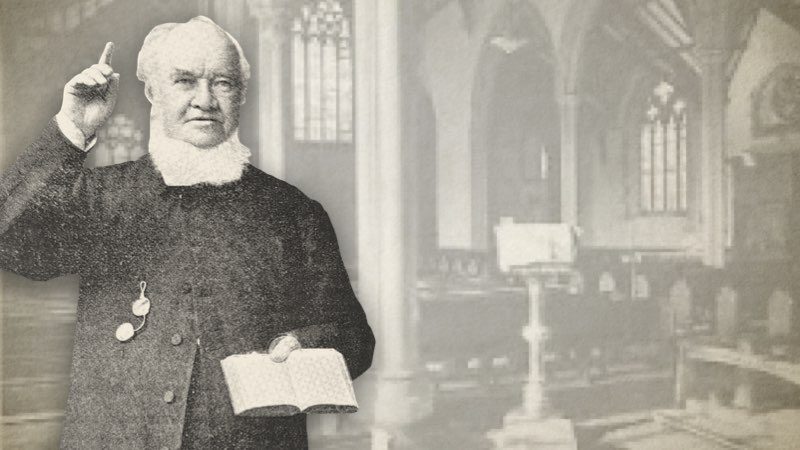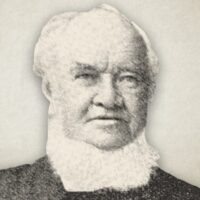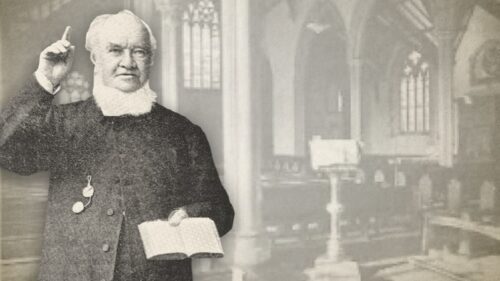
The Life And Ministry Of David Doudney
Earthen Vessel 1893, Page 197:
The Late Dr. Doudney
We deeply regret to announce the death of David Alfred Doudney, which took place at Southsea, on Friday night, April 21st, at the advanced age of 82.
Mr. (afterwards Dr.) Doudney in early life carried on business as a printer, in Long-lane, City, on the site where the Aldersgate-street Railway Station now stands. Deceased was born on March 8, 1811, at Mile End, Portsea. He left home at the age of 13, and was apprenticed to a printer at Southampton, with whom he remained some years after the close of his articles. Subsequently he came to London and commenced business as a printer, first at Holloway, then in the City, and founded the City Press printing establishment in Long-lane, where the first edition of Denham’s Hymn-book, now so generally used in the Strict Baptist Denomination was first printed.
Shortly afterwards he purchased the Gospel Magazine, of which be became the editor, a position he held up to the very last. It is not without interest to note, as showing his literary activity, that only on one occasion during the whole of his fifty-three years’ editorship did the Gospel Magazine appear without the first article being from his pen. The Doctor subsequently founded Old Jonathan, of which he also remained the editor until the day of his death. In spite of his active ministerial and editorial labours, deceased found time to devote himself to literary research, and to write many religious works, as well as innumerable pamphlets, all deeply imbued with the evangelistic views he so strongly held. In fact, he was never so happy as when at work. He remained in Long-lane until the year 1846, when, having disposed of the business to Mr. W. H. Collingridge, his assistant, he visited Ireland, and entered the Established Church, being ordained by bishop Daly to a curacy in Tipperary. There he is still fondly remembered for his great exertions at the time of the dreadful famine that occurred in the following year.
In 1848 he left Tipperary to undertake a curacy at Bonmahon. It was while there that he established a printing school, the extent of which may be judged from the fact that “Dr. Gill’s Commentary,” a work extending to six octavo volumes of 1,000 pages each, was printed by the Irish boys who worked under his tuition.
In 1858, after ten years good and faithful service—a service through-out which he was the subject of many bitter persecutions—Mr. Doudney left lreland, and commenced his labours at St. Luke’s, Bedminster, the parish with which he remained associated as the vicar until three years ago he retired on account of advancing age and consequent infirmities. When he was appointed to the living, there was but a temporary wooden church in the parish. Soon after, however, mainly through his indefatigable zeal, a permanent church, a vicarage, some fine schools, and mission hall were erected at a total cost of upwards of £50,000.
Not long after he entered upon the living, the Doctor established a printing school on the lines of the one he was the founder of in Ireland. From this second school many of his own works, as well as others of a like character, were sent forth. It was in the year 1890 that the Doctor resigned his living and retired to Southsea, where he resided with his wife for the remainder of his days. Of Dr. Doudney’s large family four sons and two daughters are living. The news of his death, aged as he was, and failing as he had been for some time, will be received with deep regret by many, and more especially by the readers of the Gospel Magazine, to whom he was known, not merely as the editor, but as a friend and confidant, a sympathizer with them in their sorrows, and a participator with them in their joys. Close indeed was the relationship existing between editor and readers. On three occasions he was the recipient at their hands of gratifying marks of their good-will and affection. The last such presentation took place only three years ago, when at the Memorial Hall, London, with Sir Andrew Lusk in the chair, supported by the Baroness Burdett-Coutts, he was presented with an illuminated address and a cheque for £1000 in celebration of his jubilee. Mr. W. H. Collingridge acted on each occasion as honorary secretary.
A few words as to the two charitable organizations with which the Doctor was closely identified, will serve to bring our sketch to a close. The one charity in which he had throughout his life taken an active interest was the Aged Pilgrims’ Friend Society, for which he had preached on many occasions, the last two being at St. Mary Woolnoth, and St. Andrew-by-the-Wardrobe, London. The second charity which the Doctor had keenly at heart was the Printer Corporation, with which he was officially connected as the honorary chaplain of the alms-houses, Wood Green. Here, in the presence of a sorrowing congregation of the inmates, a memorial service, conducted by Mr. W. P. Wood, of Mark-lane, was held on Sunday afternoon, April 23.
The funeral, which took place April 25th, was attended by hundreds, including many members of the St. Luke’s congregation, who came to pay a last tribute of affection and respect to their late pastor, and whose presence afforded ample testimony, if any were needed, of the esteem in which the Doctor was held by all who were privileged to know him. The Rev. D. A. Doudney, rector of Ore, Hastings, son of deceased, officiated at the proceedings in the Church; while the Rev. J. C. Martin, of the Circus Church, Portsea, and St. Simon and St. Jude, Southsea, an old friend, delivered an impressive address to the many mourners who gathered around the grave.
Several hundreds of letters and telegrams from friends throughout the country have been addressed to Mrs. Doudney and the members of the family, sympathizing with them in their sad bereavement. The Baroness Burdett-Coutts and Mr. Alderman and Sheriff Renals, both of whom took an active interest in the jubilee testimonial, are amongst those who have thus come forward with expressions of sympathy. No less warm than the personal tributes have been those that have appeared during the past few days in the press. Everywhere it is recognized that the doctor’s death is a sad loss to the cause of evangelical truth. (See City Press, April 26, 1893).
David Doudney (1811-1893) was a sovereign grace preacher belonging to the Church of England. Around the year 1858, he was appointed the minister of St. Luke’s, Bedminster, Bristol. He oversaw the republication of many valuable works, among which were those belonging to John Gill and Robert Hawker. For fifty-three years he also served as editor of “The Gospel Magazine”. John Hazelton wrote of him:
“David Alfred Doudney, D.D. (1811-1893), for fifty-three years editor of “The Gospel Magazine,” was in many respects one of the most "useful ministers of the century. To an enormous capacity for work, he united great literary ability, business aptitude, and a winning personality. We would magnify the grace of God in him, and many of the Lord's people in all parts of the world to-day can testify to the fragrance of his memory and the savour and power of his sermons and writings. He was firm in his adherence to the distinctive truth of God, and at the same time manifested a kind and brotherly spirit. The Church of God owes him a great debt for his wonderful edition of "Dr. Gill's Commentary," completed in January, 1853, and followed by reprints of Gill on "The Canticles," Hawker's "Morning and Evening Portions," Hart's "Hymns," Rutherford's "Letters," and other choice works. In 1858 he left Ireland, and was soon after appointed to St. Luke's, Bed-minster, Bristol, where he lived and worked till near the close of his strenuous life. He was an admirable writer of gospel literature for the young and the poor, as "Try, Try Again," and his monthly publication, "Old Jonathan," brightly testify. He loved little children, and was never happier than when in the midst of his large schools. One writes: “O those capacious, well-filled pockets! I used to tell him I should like to have the pattern of them! Yes, who would not wish for his generous spirit and warm heart, ever ready with 'Old Jonathan,' or booklets, or some pretty present? I possess—and I have heard many others make the same grateful assertion—quite a little library of the doctor's kind gifts. Foremost a Bugster's Bible; and another book which was a valued treasure of his and ever will be also of mine—Toplady's Hymn Book. I know that in giving me this he bestowed the highest token of personal friendship. When on his dying bed and unable to speak much he asked that the following verse might be written out, and then he dated and signed it as his experience:—
'Jesus can make a dying bed
Feel soft as downy pillows are;
While on His breast I lean my bead
And breathe my life out sweetly there.'
One of his highly valued friends—John Martin, M.A., of the Circus Church, Portsea—conducted the funeral service in Southsea Cemetery. Mr. Martin, who has since followed him to his heavenly home, was a member of an old and highly esteemed family in the Isle of Ely, and for many years exercised a powerful free grace ministry in Portsmouth.




